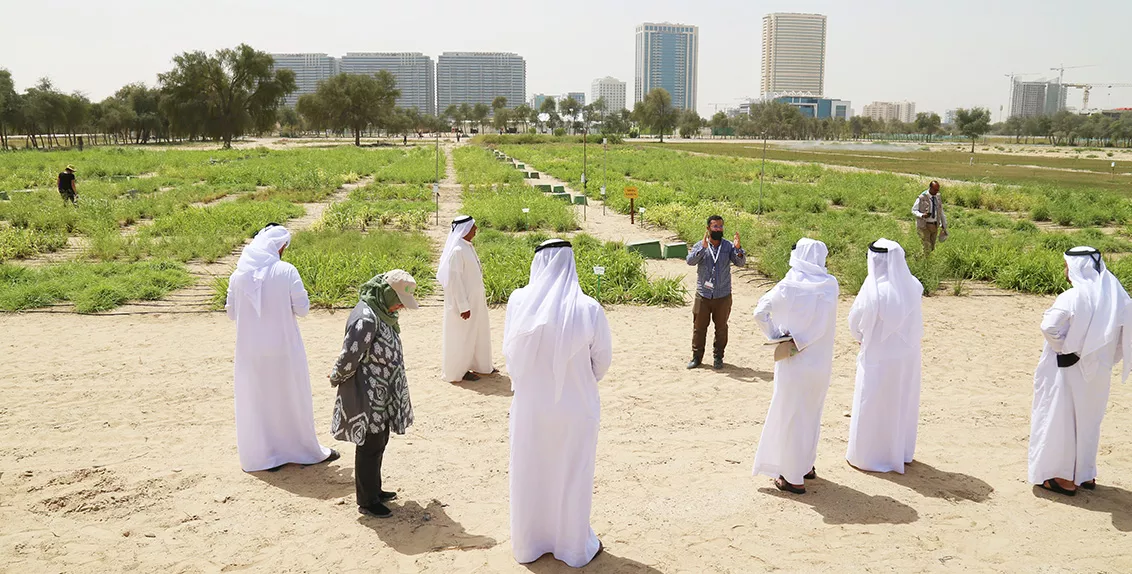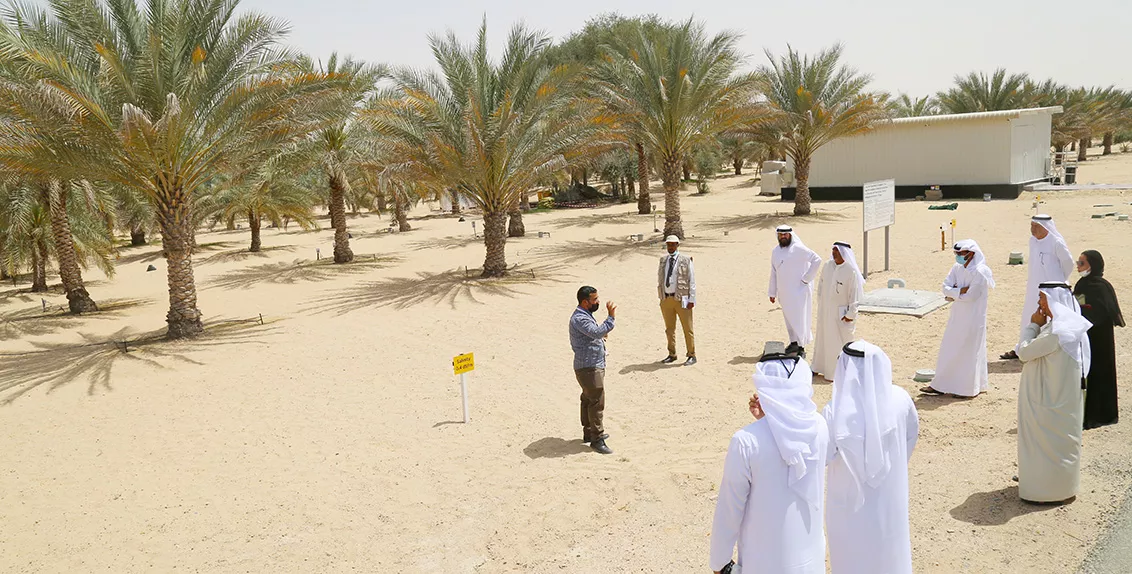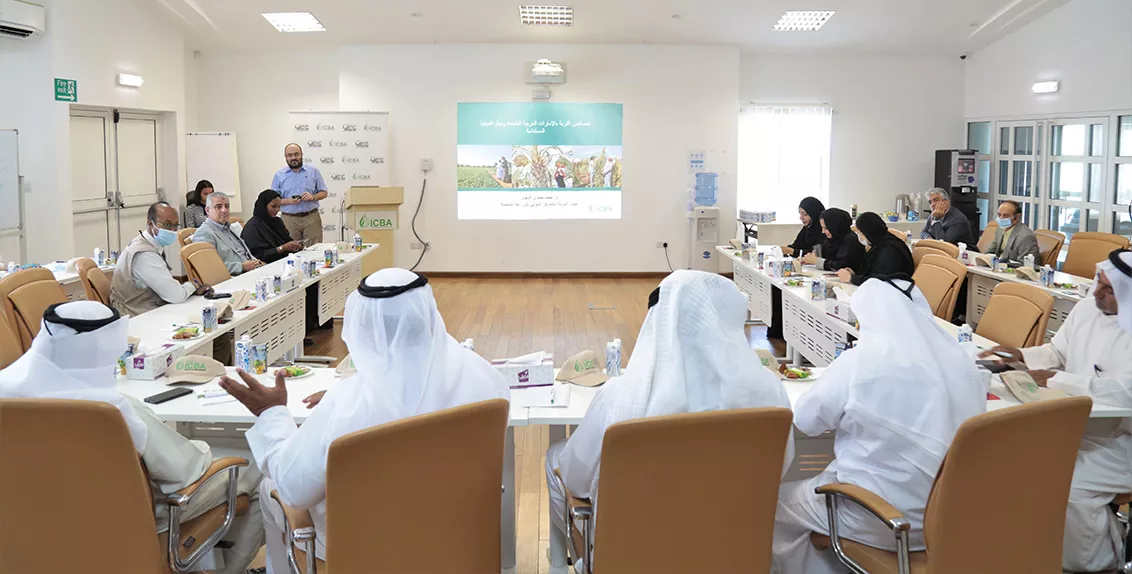ICBA hosts open day for Emirati agri-business owners, farmers to showcase sustainable agri-innovations
24 March 2022
More than 20 agri-business owners, farmers and extension specialists from across the UAE joined a special open day at the International Center for Biosaline Agriculture (ICBA) in Dubai today.
Hosted at ICBA on the initiative of H.E. Mariam bint Mohammed Almheiri, Minister of Climate Change and Environment of the UAE, the event was designed to present to Emirati agri-business owners, farmers and extension specialists a wide range of sustainable agri-technologies and climate-resilient crops that had been developed, tested and proven by ICBA and its partners to perform well in local conditions.
Organized in collaboration with the Ministry of Climate Change and Environment of the UAE and the Abu Dhabi Agriculture and Food Safety Authority (ADAFSA), the event featured a tailor-made training workshop on water-energy-food nexus innovations and a tour of ICBA’s research experiments and facilities.
H.E. Mariam bint Mohammed Almheiri said: “The UAE Government has adopted an innovative approach to tackling challenges and turning them into opportunities for growth that is key to addressing the critical water-food-energy nexus. We are proud to partner with ICBA and ADAFSA on this initiative that we believe will go a long way in educating stakeholders in the agricultural sector about game-changing technologies and crops suitable for the UAE environment.”
The event was part of ICBA’s efforts to help local agri-business owners, farmers and extension specialists to adopt best practices in sustainable agricultural production and natural resources conservation.
Welcoming the participants, Dr. Tarifa Alzaabi, Acting Director General of ICBA, said: “The Government of the UAE pays special attention to boosting the agricultural sector and enhancing food security and environmental sustainability in the country through a large variety of initiatives, measures and incentives, and making the nation a world-leading hub for agri-innovations. And our center is proud to support national efforts to this end by sharing its experience and knowhow and developing the capacities of our local stakeholders, and particularly farmers. Over the past 23 years, our center has accumulated a vast amount of knowledge and data based on our extensive research studies in local conditions. So we are always happy to provide our technical expertise and assistance to all our partners and stakeholders, and thus contribute to the adoption of solutions for sustainable agricultural development.”
During the event, the participants were briefed about some of the latest agri-technologies suited to the environmental conditions of the UAE. They also visited various experiments, including the longest-running study in the country to assess the long-term impact of different levels of irrigation water salinity on the growth and production of 18 date palm varieties from Iraq, Saudi Arabia and the UAE.
The participants also learned about salt-tolerant forages adapted to the local environment; diverse and nutritious crops like millets that can grow under varying salinity and irrigation conditions; resource-efficient controlled-environment agriculture technologies; and the integrated agri-aquaculture systems that make it possible to grow fish, vegetables and halophytic plants such as Salicornia in a circular and sustainable way.
Since 1999, ICBA has carried out research-for-development activities and programs in around 40 countries in Central Asia, the Middle East, North Africa, South Asia, the South Caucasus, and sub-Saharan Africa.
ICBA’s scientists have reached out to and demonstrated best biosaline agriculture practices to more than 30,000 farmers.
The center has developed and introduced 24 technologies and crops in around 30 countries. They range from improved genotypes of quinoa and Salicornia to drought monitoring solutions to integrated agri-aquaculture systems showcased at the Expo 2020 Dubai.
Under its plant genetic resources program, ICBA has distributed nearly 9,000 seed samples to scientists, farmers and other stakeholders in 57 countries.
The center’s science-based recommendations have informed such policies and strategies as the UAE Water Conservation Strategy; the UAE Agricultural Strategy; the Kuwait Food Security Strategy; and the Oman Salinity Strategy.
ICBA has also worked to build individual and institutional capacities in different countries, with a specific focus on youth and women empowerment through such dedicated initiatives as the ICBA Youth Engagement Society, the Arab Women Leaders in Agriculture and other certification programs. More than 9,000 people from 93 countries have benefitted from ICBA’s capacity development programs to date.













